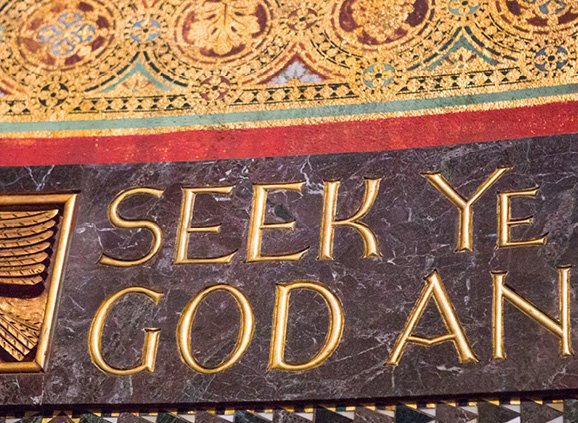
- Education Forums
Bible Study Guide for Sunday, March 28, 2021

- Isaiah 50:4-9a
- Philippians 2:5-11
- Mark 15:1-39
- Psalm 31:9-16
Our Palm Sunday liturgies seem to spark some whiplash. We begin with the crowd joyfully acclaiming Jesus as the long-promised Messiah as he enters Jerusalem and a few days later they were shouting “Crucify him!” It’s possible that these were different crowds. Surely not every single person in the greater Jerusalem area was at each event. Maybe we see Jesus’ allies at the triumphal entry and his opponents on Good Friday. Maybe. Or maybe we see people turning on Jesus after he disappointed them. They were expecting a Messiah who would finally restore the Promised Land. For nearly six centuries they were still waiting and hoping for a Messiah who would drive out the occupiers and they could finally once again live as an independent nation on the land God had promised to their forefathers. Jesus seemed to be that Messiah, the one for whom they’d been waiting for hundreds of years, and now he’s coming to Jerusalem and things are about to start happening, and then they don’t. Instead Jesus clears the Temple, prophesies judgment against Israel, and tells people to pay taxes to Rome. Jesus says that his kingdom was not of this world. This was not what people were expecting to happen next. Is it so surprising the crowds turn on him? Would we do any different?
In all four Gospels, Pilate offers to free a prisoner of the people’s choice, and offers them Jesus or Barabbas who “was in prison with the rebels who had committed murder during the insurrection.” That name is curious. “Bar” is a patronymic, so “Bar Abbas” means “The Son of the Father.” Jesus often described himself as the son of his Abba. In fact some early manuscripts give Barabbas a first name, too. Jesus!
This choice between Jesus and Barabbas probably isn’t historical. This “Passover tradition” doesn’t appear anywhere outside of the Gospels and it’s hard to imagine a Roman governor pardoning an insurrectionist in order to appease the local populace. That is just not the sort of thing that Roman governors would make a habit of doing. So if the choice between two people identified as “Jesus, Son of the Father” isn’t just some odd historical coincidence, what should we make of it?
Barabbas may have been closer to the sort of Messiah people were expecting. He was seeking to re-establish the nation of Israel as their own people on their own land as God had promised their forefathers. Jesus was also preaching that the Kingdom of God was now at hand. And yet Jesus was proclaiming that the Kingdom would come in a different way, and frankly in a way that does not make a lot of sense. He rejected worldly power and influence, preached love for our enemies, and predicted his own crucifixion. That is not how revolutions happen. That is not how we get things done. Barabbas on the other hand, knows the way the world works. Revolutions are not clean or pretty and there may well be some murders along the way to the greater good. He seems the only reasonable choice. We probably would have chosen Barabbas too. May Jesus have mercy on us.
- What are some times when we’ve had to choose between very different means to reach a good goal?How have you made those choices?
- Jesus’ path does not make a lot of sense, and to a significant extent we won’t see its fulfillment this side of eternity. But sometimes we get glimpses.Have you seen times when the harder, less realistic path brought forth good fruit?
Author: Kristen Filipic
- January 2024
- December 2023
- November 2023
- October 2023
- September 2023
- June 2023
- May 2023
- April 2023
- March 2023
- February 2023
- January 2023
- December 2022
- November 2022
- October 2022
- June 2022
- May 2022
- April 2022
- March 2022
- February 2022
- January 2022
- November 2021
- October 2021
- September 2021
- August 2021
- July 2021
- June 2021
- May 2021
- April 2021
- March 2021
- February 2021
- January 2021
- December 2020
- November 2020
- October 2020
- September 2020
- August 2020
- July 2020
- March 2020
- February 2020
- January 2020
- December 2019
- November 2019
- October 2019
- September 2019
- August 2019
- July 2019
- June 2019
- May 2019
- April 2019
- March 2019
- February 2019
- January 2019
- December 2018
- November 2018
- October 2018
- September 2018
- August 2018
- July 2018
- June 2018
- May 2018
- April 2018
- March 2018
- February 2018
- January 2018
- December 2017
- November 2017
- October 2017
- September 2017
- July 2017
- May 2017
- April 2017
- March 2017
- February 2017
- January 2017
- December 2016
- November 2016
- October 2016
- September 2016
- August 2016
- May 2016
- April 2016
- March 2016
- February 2016
- January 2016
- December 2015
- November 2015
- October 2015
- October 2013
- September 2013
At "Educational Forums," enrich your spiritual journey by exploring our resources including videos of lectures, essays by priests, and other pieces about our faith, our church, and what it means to be a disciple of Jesus in the 21st century.


Comments